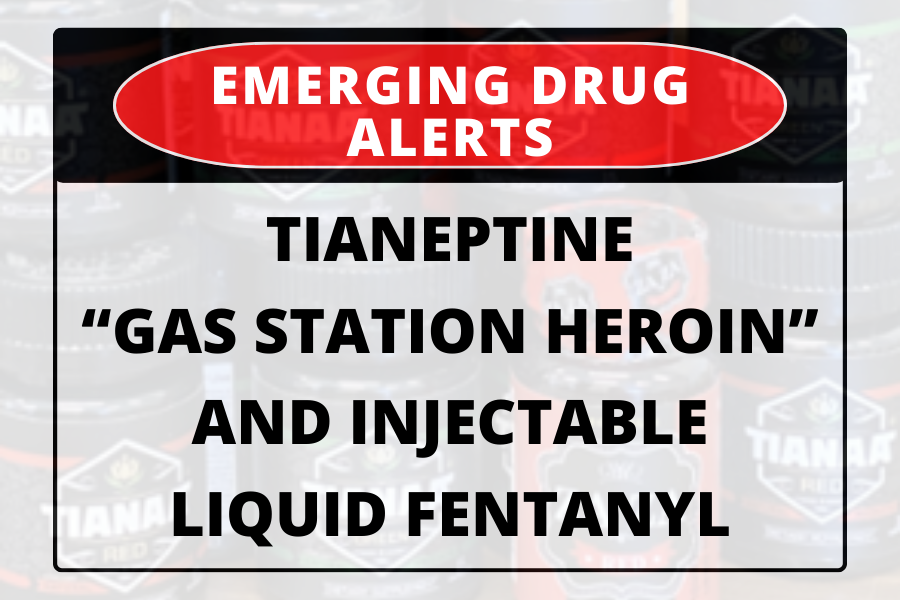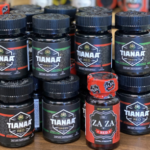The landscape of substance use is constantly evolving due to the introduction of new and potent drugs into the illicit drug supply and diversion of regulated pharmaceutical products. Among these, two substances have garnered significant attention, prompting the issuance of health alerts for tianeptine and injectable liquid fentanyl.
Tianeptine
Tianeptine, also known as “gas station heroin,” is available in various forms, from flavored elixir shots to capsules, powders, and even as counterfeit pills designed to resemble hydrocodone and oxycodone. Products containing tianeptine are readily available in gas stations, convenience stores, and online, often under the names of ZaZa, Tiana, Neptune’s Fix, and Pegasus. Despite lacking approval for any medical use in the U.S., tianeptine is falsely marketed for a variety of conditions, including as a dietary supplement, as a smart drug to enhance cognition, or as a means to manage opioid cravings.
The drug acts as an antidepressant and in high doses, produces euphoria. Toxicity can lead to sedation, respiratory depression, coma, overdose, and death. The number of severe illnesses and poison control cases stemming from exposure to tianeptine has increased dramatically. In the U.S., only 11 poison control cases involving tianeptine occurred between 2000 and 2013. However, in 2020, this number skyrocketed to 151 cases. More recently, a spike in severe illnesses from tianeptine products occurred in New Jersey. All of these patients presented with altered mental status and the majority were admitted to an intensive care unit (ICU).
Analysis of products labeled as ZaZa and Neptune Fix revealed the presence of additional substances including kava, synthetic cannabinoids, THC, and CBD. An investigation of 90 blood samples from deceased individuals between 2018 and 2023 uncovered a common combination of tianeptine with ethanol, kava, gabapentin, and fentanyl.
Tianeptine is not currently scheduled under the Controlled Substances Act, federally; however, several states have acted including Florida. Recently, the Florida Attorney General Ashley Moody filed an emergency rule categorizing tianeptine as a Schedule 1 substance.
View the two alerts for tianeptine below:
Injectable Liquid Fentanyl
Reports involving the theft or diversion of injectable fentanyl solutions from healthcare facilities in the U.S. signal a potential exacerbation of the existing fentanyl crisis. Additionally, law enforcement agencies have seized bulk quantities of illicitly manufactured fentanyl (IMF) in liquid form from Arizona and Kentucky. These liquid solutions pose similar dangers as counterfeit pills and powders as they may contain lethal doses and dealers may mix adulterants such as xylazine, cocaine, and other fentanyl analogs into the solution.Top of Form
Diversion of injectable liquid fentanyl from pharmaceutical sources has also been detected in countries where IMF has not yet emerged, including Nigeria, Colombia, El Salvador, Honduras, Argentina, Brazil, and Costa Rica. This situation is extremely concerning as such diversion could introduce fentanyl into drug markets that are not accustomed to illicit opioid use.
Visit the health alerts for injectable liquid fentanyl below:
References:
- https://www.cfsre.org/nps-discovery/public-alerts/emerging-drug-alert-tianeptine
- https://www.cdc.gov/mmwr/volumes/73/wr/mm7304a5.htm
- https://www.cfsre.org/nps-discovery/public-alerts/colombo-plan-health-alert-injectable-liquid-fentanyl#:~:text=Public%20safety%20and%20public%20health,an%20existing%20fentanyl%20epidemic%20worse.
- https://www.saveoursociety.org/news-articles/floridas-battle-against-gas-station-heroin-and-synthetic-cannabinoids-a-crucial-crackdown-on-deadly-substances/
- Photo of tianeptine products retrieved from: https://www.myfloridalegal.com/newsrelease/video-attorney-general-moody-outlaws-gas-station-heroin-florida











